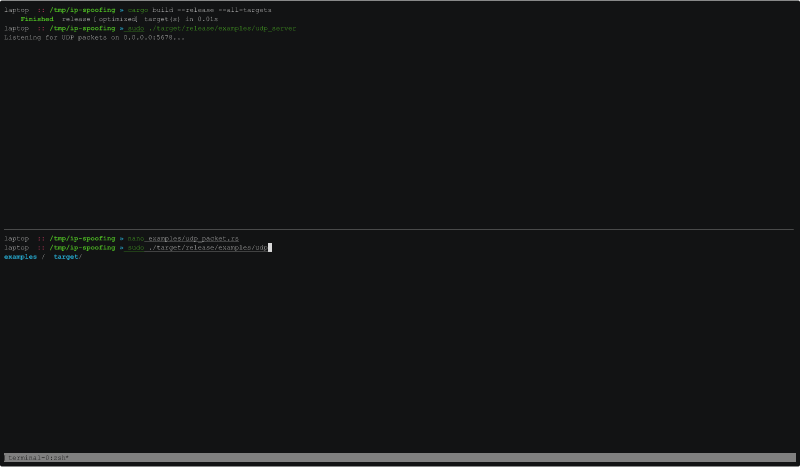2 releases
| 0.1.1 | Sep 8, 2024 |
|---|---|
| 0.1.0 | Jan 31, 2023 |
#9 in #ipv4-address
32 downloads per month
11KB
174 lines
ip-spoofing
Library to send fake IPv4 headers & UDP/TCP-SYN packets to perform L3/L4 attacks
In short, this library allows you to spoof your IP address on the network. For a better understanding, it is recommended to read the article from cloudflare: The real cause of large DDoS - IP Spoofing
It can be done on the L3 (network layer) of the OSI model
Today, not all ISPs check the integrity of IPv4 headers. Therefore, in a real network, there are 2 options for spoofing IP addresses:
-
network level IP spoofing
e.g. you have a server with the address
195.174.232.102, and the provider owns the IP range195.174.224.0 - 195.174.239.255, this means that you can use any address from the range -
unlimited IP spoofing
this allows you to spoof any ip address, you can pretend you own the address
8.8.8.8(Google Public DNS)
The only limitation of spoofing is that you can send packets, but you cannot receive a response from the server.
You can check if this library works on your local network. To attack real networks, you need a specific provider that allows one of 2 spoofing options.
Code samples
You can see other code samples in the examples/ directory.
use ip_spoofing::{self, RawSocket, ReusablePacketWriter};
/// This example shows how to generate fake UDP packet
/// that delivers `b"hey"` bytes from "8.8.8.8:1234" to "127.0.0.1:5678".
///
/// I.e. the attacker changes its IPv4 address to 8.8.8.8 (Google Public DNS)
fn main() -> ip_spoofing::Result<()> {
let socket = RawSocket::new()?;
let mut writer = ReusablePacketWriter::new();
socket.send_fake_udp_packet(
&mut writer,
[8, 8, 8, 8], //source IPv4 address
1234, //source port
[127, 0, 0, 1], //destination IPv4 address
5678, //destination port
b"hey", //data
64, //TTL on most Linux machines is 64
)?;
Ok(())
}
Useful links
-
Internet Protocol version 4 wikipedia article describing the IPv4 header
-
rickettm/SendIP repository provides command line tool to allow sending arbitrary IP packets
useful code of the SendIP project written in C:
Dependencies
~5MB
~111K SLoC
